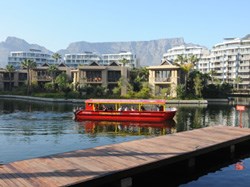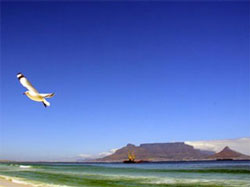
Top stories



LegalNigeria to implement new tax laws from January 1 despite calls for delay, Tinubu says
Camillus Eboh 20 hours

EducationChoosing a career? In a fast-changing job market, listen to your inner self – counsellor
Kobus Maree 19 hours


Each year the event provides a platform for the tourism industry to engage on relevant topics that could enhance the destination's competitive advantage and in turn contribute towards the growth of the industry. Under the banner of this year's theme 'Cultural Tourism: Bringing the past, present and future together', a variety of speakers from both South Africa and abroad presented in-depth insights and information covering all aspects of cultural tourism to decision makers and stakeholders in the tourism industry.
The event was attended by the Western Cape Minister for Finance for Economic Development and Tourism Minister, Alan Winde ; the executive Mayor of the City of Cape Town, Alderman Patricia de Lille; representatives from provincial government; City of Cape Town officials; regional and local tourism organisations, media and 280 various industry stakeholders.
In his official welcome Solly Fourie, the Head of Department: Economic Development and Tourism in the Western Cape, said, "When it comes to travelling to another part of the world, culture is one of the main 'pull factors'. The rich and vivid history of South Africa makes the destination ideal for cultural/heritage tourism. The Western Cape, in particular, remains at the forefront of cultural tourism with cultural villages and museums found throughout the province. We cannot afford to miss the opportunity of amplifying the value adds that cultural tourism offers to the South African and Western Cape product. We, as tourism partners, need to tap into, drive awareness around and integrate cultural tourism products into mainstream tourism. We also need to develop creative cultural tourism experiences that are not only sustainable and lucrative for the country in the long-term but also protect and preserve the very heritage that attracts visitors to our destination. By sharing our past with the world and the rest of the country we can make Cape Town and the Western Cape THE destination of choice for local and international tourists now and in the future."
Mayor de Lille officially opened the Conference with her highly inspirational address in which she stated, "The tourism market is one that we should never take for granted. After the worst of the recession a couple of years ago, Cape Town learnt the hard way that even the most established markets are vulnerable. However, as with all bad news, it forced us to look beyond our received wisdoms to what makes us a great city. It forced us to strategise, to look for innovative solutions and to truly become the dynamic city that we always boast being. It forced us to stake our claim and demonstrate who we are and who we want to be. We know of our beauty, we know of our scenery...so does the world. But in this day and age, these assets, powerful as they are, cannot sustain us."

She continued, "There are other places of beauty out there, other destinations of wonder. Moreover, they are preparing their plans to attract that market of visitors that is willing to invest in paying a little bit more for visiting long-haul destinations. So we have to look to what sets us apart, we have to look at what makes us different, we have to look at what makes us, us. To truly market ourselves, we have reached into the core of our city's being and that core is our heritage and our culture. The future we are trying to craft as a leading city of Africa and the developing world is tied to where we have come from. Our future starts from our past and, as is fitting for our great society, the building blocks from which we make our city tomorrow are strong and varied. They help us realise our future potential. It is this potential that we wish to share with the world and it is this potential that we hope will form a unique cornerstone of our tourism strategy. Indeed, this history and the future we will build shall be a new competitive advantage and moreover, that we share our heritage with those who want to build the future together with us."
Acclaimed author, political doyen and Western Cape Minister of Cultural Affairs & Sport, Dr Ivan Meyer, echoed the Mayor's sentiments and stated that Western Cape Government supports cultural tourism. "Historically, culture and tourism have been considered step brothers. Today, I am glad that culture and tourism have become brothers. The theme of today's conference focuses on the past, present and future. Past refers to the fact that we must celebrate our rich cultural history. Present means we have now the opportunity to change the future while the future means that we must identify what we can celebrate tomorrow. We can employ cultural tourism to turn this good city into a great city. There is many a cultural landscape yet to be explored by our own tourism industry. Each of these sites provides an insight into the potential for heritage-based tourism in the Western Cape. As these kinds of heritage resources are rare, finite and easily destroyed, careful consideration must be taken in promoting their tourism potential." He announced that there is an application to have the Cape Winelands declared a World Heritage site and made mention of several places that he declared as Provincial Heritage sites. He concluded by saying that cultural tourism is not new but that its footprint needs to be expanded.
In his keynote address MEC Winde revealed that tourism accounted for 10% of the provincial GDP and by tourism stakeholders and government working together, this figure could be increased to 15% by 2015. He revealed that the various accolades that Cape Town and the Western Cape had received over the past year would help in this regard. "From February 2011 to February 2012 there has been 12.3% growth in tourist numbers. I believe that this is the start of a trend. Domestic tourism is the bedrock on which we must build and then we can look at the region, Africa and the world. Events like the Cape Town Carnival, Cape Town Jazz Festival and Pick n Pay Cape Argus Cycle tour not only grow our economy but take us to the world. The tourism industry contributes 5% to the country's GDP and that provides employment for one in twelve people. Tourism is a great way to create jobs - after all tourism is about people. In order for us to get the provincial GDP to grow from 10% to 15% we need to look at what we do and how we do it."